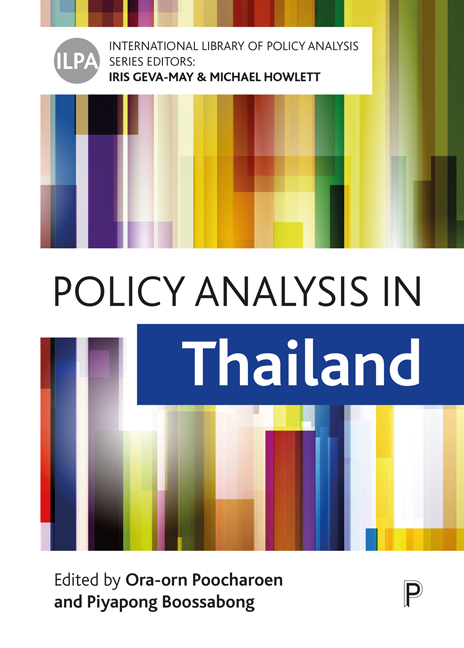Book contents
- Frontmatter
- Contents
- List of figures and tables
- List of abbreviations
- Notes on contributors
- Editors’ introduction to the series
- Introduction
- Part One History, styles and methods of policy analysis in Thailand
- Part Two Policy analysis within executive government
- Part Three Policy analysis beyond executive government
- Part Four Political parties and interest groups in policy analysis
- Part Five Policy analysis education and research
- Index
Introduction
Published online by Cambridge University Press: 20 January 2024
- Frontmatter
- Contents
- List of figures and tables
- List of abbreviations
- Notes on contributors
- Editors’ introduction to the series
- Introduction
- Part One History, styles and methods of policy analysis in Thailand
- Part Two Policy analysis within executive government
- Part Three Policy analysis beyond executive government
- Part Four Political parties and interest groups in policy analysis
- Part Five Policy analysis education and research
- Index
Summary
Unlike Western societies, where significant reflections on policy analysis have been made throughout history (Blum and Schubert, 2013; Nispen and Scholten, 2014; Hird, 2018), the state and the development of this subject have never been thoroughly examined in Thailand. This volume aims to fill that large gap. It provides rich descriptions of Thailand's policy analysis system and its actors. It describes historical trajectories to explain why Thailand is where it is today. It also offers insights into the the future and recommendations for advancing policy analysis education, training and practice in the country.
Policy analysis in Thailand is heavily influenced by the West. This is part of global history that has contributed to the continuous epistemic isomorphism and knowledge transfer from advanced economies to Asia, particularly Southeast Asia (Ungsuchaval et al, 2023). This started during the colonial period and was amplified during the Cold War (Turner, 2018). Such isomorphism and knowledge transfer in the global domain are never-ending processes. We observe that the field of public policy and the practice of policy analysis is slowly progressing in Thailand. This is a result of the domination of senior scholars, who framed the static standard of policy knowledge, and the rigid Thai bureaucratic system that operates in a weak democratic, high power-distance political and cultural context.
With this process, it is also worth learning how such isomorphism and knowledge transfer have so far been assimilated into the social, economic and political contexts of Thailand. The discussion in this volume points out the key critical reflection that most policy knowledge selected to be transferred to Thailand mainly promotes depoliticised policy analysis. The field of public policy is thus perceived by most scholars and practitioners as the subfield under the umbrella of public administration, with the old mindset of the politics– administration dichotomy (Ungsuchaval et al, 2023). As a consequence, policy analysis in Thailand rarely challenges the political power, while many times it legitimises the political domination and protects unjust structures. This became the foundation of the field, until only recently, when public policy extended its boundary to be more interdisciplinary with new schools of thought (Boossabong and Ungsuchaval, 2021).
- Type
- Chapter
- Information
- Policy Analysis in Thailand , pp. 1 - 8Publisher: Bristol University PressPrint publication year: 2023



